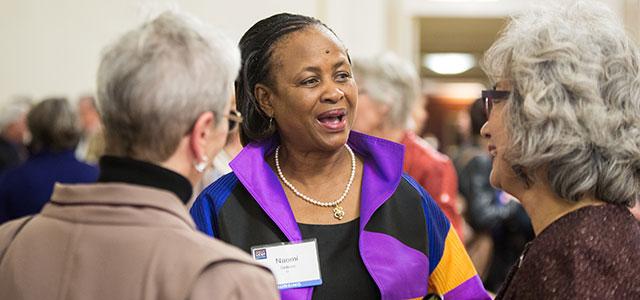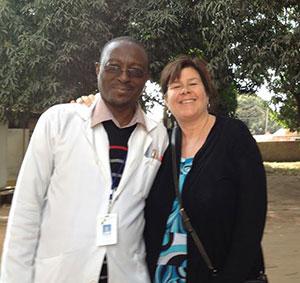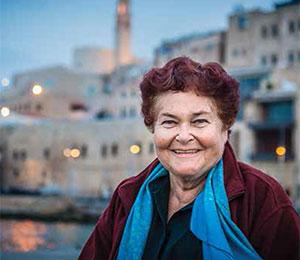
Naomi Seboni at the UCSF Alumni Weekend 2015 (photo by Elisabeth Fall)
Changing Nursing, Changing the World: Four Alumni Who Make a Difference Globally
“Nursing should be front and center in the global health conversation, because 80 to 90 percent of the people who deliver care outside of the developed world are nurses. And that’s not going to change,” says Kimberly Baltzell, director of the UC San Francisco School of Nursing’s Center for Global Health, which celebrates its first year of operation this month.
The center is part of a schoolwide commitment to global health that has strengthened over the past two decades. The School’s reputation as a leader in the field makes it a natural resource for training nurses to provide both clinical care and nursing leadership for vulnerable populations in the US and across the world. This is largely due to the passion and commitment of the School’s students, faculty and alumni, four of whom are profiled here.
Naomi Seboni: Advancing Nursing and Reproductive Health in Southern Africa
Naomi Seboni (PhD ’93) was doing her bachelor’s degree at the University of Botswana and Swaziland when she realized what she wanted to do with her life. “I used to see young girls come into the family planning clinic, scared to line up with adult women. During those times, if a girl got pregnant, she was never allowed to go back to school. That really influenced me, and I decided to study adolescent girls’ sexuality and sexual risk-taking behaviors,” she says.
Seboni had already decided on a nursing career after a book about Florence Nightingale inspired her as a teen. But at the time, there was no bachelor’s degree in nursing at the University of Botswana, so she did a one-year postbasic diploma in midwifery at the Institute of Health Sciences in Gaborone, Botswana. When the University of Botswana began offering a bachelor’s degree several years later, she pursued it. The university recognized her potential as a lecturer and sent her to Columbia University in New York for a master’s degree in 1982. “It was the first time for me to travel abroad,” she says, laughing. “Traffic lights and elevators were all new to me. You can just imagine a village girl thrown into New York City!”
She returned to the University of Botswana to teach and in 1996 became head of the nursing department there. A W.K. Kellogg Foundation sponsorship allowed her to join the PhD program at UCSF School of Nursing, where she blossomed under the mentorship of three nursing legends: Afaf Meleis (now Margaret Bond Simon Dean of Nursing Emerita at the University of Pennsylvania School of Nursing), William Holzemer (now dean of the Rutgers School of Nursing) and the late Susan Gortner. In June 1993 she returned to Botswana to help develop the University of Botswana’s generic (entry-level) and master’s degree programs in nursing.
Seboni’s PhD dissertation, titled “Botswana Female Youth: Perception of Sexuality and Risk-Taking Behaviors,” opened the door to what would become a key chapter in her career. “At UCSF they emphasized that when you got home, you had to disseminate your findings,” she says. So she talked about her work to government departments and nongovernmental organizations (NGOs). The Botswana Family Welfare Association (BOFWA), an affiliate of the International Planned Parenthood Federation (IPPF), invited her to give a talk about her research, which led to membership in the association and a long and fruitful partnership, culminating in 2011 with her election as the first African woman to lead IPPF. Her second term, which she won by acclamation, will end in 2017. She continues to conduct research on adolescents’ health and development.
IPPF is very diverse, says Seboni, but its members are also united in the commitment to advocate for and promote access to quality sexual and reproductive health and rights for all. “We believe that people should be allowed to express their own sexuality and that young people should be able to make informed decisions about their lives,” she says.
In the meantime, Seboni’s commitment to developing nursing in Africa has never wavered. In 2004, she and the late Leana Uys, then dean of the School of Nursing at the University of KwaZulu-Natal in South Africa, initiated what would become the African chapter of Sigma Theta Tau International, the Honor Society of Nursing. Professors from the four university-based schools of nursing in southern Africa (three in South Africa and one in Botswana) were founding members of the African chapter. (The UCSF Alpha Eta chapter of Sigma Theta Tau helped the African chapter get established and now offers research grants to its members.) With sponsorship from the Ford Foundation and the African Development Institute, the African chapter of Sigma Theta Tau developed curricula and assisted countries in east and central Africa without university-based nursing programs to implement them.
In 2006, when the University of Botswana nursing department broke off from the Faculty of Education to become its own school in the Faculty of Health Sciences, Seboni was tapped as head (the equivalent of dean) and assumed the directorship of the school’s World Health Organization (WHO) Collaborating Centre for Nursing and Midwifery Development in Sub-Saharan Africa. With the World Health Organization’s support, Seboni and other nurse leaders and scholars from several countries in the sub-Saharan WHO African Region developed a prototype curriculum for nursing and midwifery programs at three levels: basic, postbasic and postgraduate. They also developed a prototype nursing and midwifery regulatory framework for the WHO African Region. Seboni serves as a member of the WHO African Advisory Committee for Research and Development, and has been a member of the Lancet Commission on Women and Health for the past two years.
It’s all part of a career that has been dotted with honors. In 2006 she was selected by the UCSF School of Nursing Alumni Association to join 99 other luminaries on the School’s Centennial Wall of Fame. Earlier this year, she returned to campus to receive the Alumni Excellence Award at UCSF’s 150th anniversary celebration.
Carol Dawson-Rose: Positive HIV Prevention in San Francisco and Mozambique
Watching friends suffer and die during the early HIV/AIDS crisis in Los Angeles spurred Carol Dawson-Rose (MS ’93, PhD ’99) to go into HIV/AIDS nursing and research. She received her master’s and PhD from the UC San Francisco School of Nursing, where she now teaches in the Department of Community Health Systems. Her experience and research into risk reduction and HIV transmission prevention led her from San Francisco to Mozambique to expand and adapt the Positive Prevention program, a clinic-based intervention that prioritizes the HIV prevention needs of people living with HIV and public health priorities to decrease HIV transmissions.
 Carol Dawson-Rose with a colleague in Mozambique Dawson-Rose’s work in sub-Saharan Africa began in 2006, when she went to Mozambique to replicate an HIV intervention project she’d helped develop in the US. That trip led to a nine-year relationship and several different projects to develop and adapt her HIV intervention for use in Mozambique.
Carol Dawson-Rose with a colleague in Mozambique Dawson-Rose’s work in sub-Saharan Africa began in 2006, when she went to Mozambique to replicate an HIV intervention project she’d helped develop in the US. That trip led to a nine-year relationship and several different projects to develop and adapt her HIV intervention for use in Mozambique.
Positive Health, Dignity and Prevention, which is known as Positive Prevention in Mozambique, is an intervention that integrates HIV prevention (early HIV treatment, disclosure to and HIV testing of partners) into HIV clinical care. The Positive Prevention program trains clinicians in low- and middle-income countries to address prevention needs, get and keep patients connected to care and support adherence to antiretroviral medication.
One of the key elements of the program is getting clinicians to embrace an intervention that emphasizes risk reduction or incremental change rather than giving an edict to abstain from a behavior. Supporting clinicians to use a concept of risk reduction or incremental change is difficult anywhere, says Dawson-Rose, because clinicians aren’t necessarily trained to think that way. “It’s primarily working with clinicians to change how they feel and may treat people who are living with HIV. They may treat these patients with a certain amount of discrimination. This work focuses on the rights of people living with HIV, the right to have active sex lives, have a family, have children and live healthy.”
When she brought the program to Mozambique, Dawson-Rose and her colleagues had to make adaptations to accommodate differences in culture, environment and the way the HIV epidemic has played out there. In San Francisco, the largest group affected by HIV is men who have sex with men. In sub-Saharan Africa, it’s both men and women. Many are women diagnosed when they have an HIV test as part of prenatal care. While the population focus may be different between San Francisco and Mozambique, the essential program addressing the prevention needs of people living with HIV is unerringly similar.
The overloaded health system in Mozambique makes behavior-based interventions particularly challenging; it’s difficult to get providers engaged in the conversations necessary to address risk reduction. “We have to figure out how to collaborate with people to see what might work for them,” says Dawson-Rose. “In some settings, what we think we should be doing can’t be done because there aren’t the same resources or infrastructure.” She works with several different government and international organizations and advocacy groups to find out what the needs are and make sure her work fits with their priorities.
She and her colleagues have developed an HIV prevention curriculum and toolkit for clinicians, with materials for providers in both English and Portuguese (the primary language in Mozambique). Over the past nine years, they have conducted research-based projects aimed at fine-tuning and improving the program as it evolves.
For example, a recent pilot project used peer counselors to act as navigators for people receiving positive HIV tests, to support them in the disclosure process and encourage partners to get tested. In addition to curriculum building, on-the-ground training and research, Dawson-Rose and her colleagues have helped put together a working group to create a national policy and strategic plan in Mozambique to prioritize Positive Health, Dignity and Prevention approaches within health facility settings.
Dawson-Rose has also worked on expanding Positive Prevention beyond Mozambique, using it on a smaller scale in Haiti and Namibia. “These are individuals who deserve our respect and need to be treated with respect,” she says. “Their lives shouldn’t be limited.”
Karen Duderstadt: Ambassador for Advanced Practice Nursing in Japan and Beyond
After working with Latino and Spanish-speaking populations as a pediatric nurse practitioner at San Francisco General Hospital, Karen Duderstadt (MS ’90, PhD ’06), clinical professor in the Department of Family Health Care Nursing, parlayed her interest in serving low-income families into a PhD in nursing and health policy. Since that time, she has focused on improving access to quality health care for families from the US and across the world.
It was during her PhD program that Duderstadt first applied her skills outside the US with the Fundación Pediátrica Guatemalteca, a nonprofit group that provides medical and dental services to children in the Central American country, where more than half the population is below the national poverty line, and 13 percent of the population lives in extreme poverty. Duderstadt began taking pediatric nurse practitioner students to work with the Fundación to provide care that wasn’t otherwise available in Guatemala at the time.
Duderstadt and her students helped provide assessments for children in rural areas who needed specialized care, such as cleft-palate procedures or orthopedic or eye surgery. The children would receive care at the Fundación’s surgical unit in Guatemala City, where international teams would also train Guatemalan clinicians to do the specialized procedures.
“It was a natural progression of my work in San Francisco, because so many of the families we worked with here were originally from Central America,” says Duderstadt. It also helped cement her commitment to capacity building around the world. “Some of the best teams in the US came to help with that effort, and the process was really interesting,” she says.
 Karen Duderstadt (front row, center) in the UCSF School of Nursing advanced practice skills lab with students visiting from Japan =That kind of teamwork is essential for improving health around the world, and for the past several years, Duderstadt has also been working with schools of nursing in Japan to advance the role of nursing there, particularly in pediatrics.
Karen Duderstadt (front row, center) in the UCSF School of Nursing advanced practice skills lab with students visiting from Japan =That kind of teamwork is essential for improving health around the world, and for the past several years, Duderstadt has also been working with schools of nursing in Japan to advance the role of nursing there, particularly in pediatrics.
Japan, she says, is just beginning to discover the roles advanced practice nurses can play in the health care system, as advanced practice nursing there is still tied to a more traditional hierarchy in which nurses largely carry out care ordered by physicians. “It’s not only changing the nursing roles, but changing traditional female and male roles as well,” she says.
Duderstadt has run intensive training for faculty and students across five pediatric graduate nursing programs in Japan to help them hone their pediatric physical assessment and exam skills. She notes that there are a number of cultural differences that affect how students learn and acquire skills. One example has to do with teaching physical exam skills. She says, “In the US, it’s widely accepted that our students will examine each other. In Japanese culture, touch is handled differently, so our first step was working on determining the comfort level for nurses who are in a master’s program in Japan.”
For the past 18 months, Duderstadt has also served in a unique capacity as a global health ambassador to groups from around the world who were visiting the School. Many of the visitors were especially interested in developing master’s or PhD curricula in their own countries, and part of the job was to help visitors understand the advanced practice role in the US.
“One of the challenges was matching their expectations to what would be most beneficial,” she says. “Many visitors were amazed at the role our nurse practitioners have here in terms of caring for patients, particularly in the community and having an active role in primary care settings.”
Duderstadt hopes that the visitors’ experiences will aid them not only in building their nursing programs, but also in establishing ongoing collaborative relationships across countries. One highlight of the past year was a visit from nursing faculty from Hong Kong Polytechnic University, culminating in a two-day research symposium in which top researchers from both schools gave presentations. A member of the nursing faculty from Hong Kong Polytechnic is returning to the School this academic year for further study in both teaching methodologies and research.
While the responsibility for arranging visits from international faculty and students will now fall to the School’s new Center for Global Health, Duderstadt looks forward to working with international students in the School’s master’s and doctoral programs. She says, “Every culture is unique and different, and you learn from them.”
Miriam Hirschfeld: Champion for Nursing and Long-Term Care in Israel and Beyond
This profile by Susan Godstone previously appeared in the Spring 2015 issue of UCSF Magazine.
 Miriam Hirschfeld (photo by Yoram Reshef) Miriam Hirschfeld (MS ’72, DNS ’78) laughingly shares that she chose the master’s program at UCSF because the course was short, the tuition was low, and she liked the idea of San Francisco. But she loved the School more than she could have imagined.
Miriam Hirschfeld (photo by Yoram Reshef) Miriam Hirschfeld (MS ’72, DNS ’78) laughingly shares that she chose the master’s program at UCSF because the course was short, the tuition was low, and she liked the idea of San Francisco. But she loved the School more than she could have imagined.
After returning to Israel and then coming back to UCSF to complete her doctorate, Hirschfeld accepted an appointment as director of the Generic (entry-level) Nursing Program at Tel Aviv University. That was just the beginning of a string of extraordinary appointments and accomplishments. In 1989, she accepted a position as chief scientist for nursing with the World Health Organization (WHO) in Geneva, Switzerland. Nine years later, WHO asked her to lead its Department of Human Resources for Health. Finally, she led the establishment of a department for home-based and long-term care at WHO headquarters.
Throughout her career, Hirschfeld championed improved policies for nursing education and long-term care in Israel and globally. “Lots of people need care every day of their life, and if they have family looking after them, then the family needs care too,” she says.
Humble about her own achievements but quick to praise others – in particular, her mentors at UCSF – Hirschfeld admits, albeit reluctantly, that former students now consider her their mentor.
After leaving WHO, she joined the faculty of Yezreel Valley College in Israel to establish an academic nursing program that empowered minority students. In 2012, Austria – from which she immigrated to Israel in 1966 – gave her that country’s highest presidential medal for her contributions to developing academic nursing programs in Austrian universities. In addition, she received honorary doctorates for her work from Oregon Health & Science University in Portland and the University of Nottingham in the UK. Then, in 2014, the University of Pennsylvania School of Nursing awarded her its inaugural Soad Hussein Hassan Visiting Global Scholar Award.
“But make sure you look up those people who taught me at UCSF,” she says. “They were special.”



